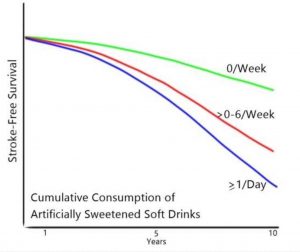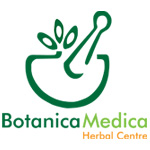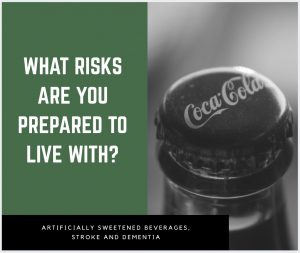ARTIFICIALLY SWEETENED BEVERAGES, STROKE, AND DEMENTIA
TAKE-HOME MESSAGE
* The association between sugar- and artificially sweetened drink intake and risk for stroke or dementia was evaluated in the Framingham Heart Study Offspring cohort. After adjusting for multiple confounders, both recent intake and cumulative intake of artificially sweetened drinks were associated with significantly greater risks for ischemic stroke and dementia.
* Similar associations were not found for sugar-sweetened drinks.
Artificially sweetened soda, stroke, and dementia
“As for butter versus margarine, I trust cows more than chemists.”
This quote by nutritionist Joan Dye Gussow supports how our manipulation of nature can get us in trouble. Last week, we reviewed how banning trans-fatty acids (a product of chemists, not nature) resulted in fewer heart attacks in New York. This week, we can see how artificial sweeteners in soda (also made by chemists) are associated with high risk of stroke (HR, 2.96) and dementia (HR, 2.89). This association was not seen with sugar-sweetened drinks.
This study should not be taken as suggesting that sugar-sweetened beverages are okay. We know that too much sugar is associated with many negative outcomes, including obesity, dysbiosis, and metabolic dysfunction. But the study should lend some caution as to the safety of artificial sweeteners. One that has had the most controversy is aspartame.
Aspartame is composed of 50% phenylalanine, 40% aspartic acid, and 10% methanol. One of several potentially toxic byproducts of aspartame is formaldehyde. Humphries et al summarized the potential cellular mechanisms aspartame has on the brain in the European Journal of Clinical Nutrition.1 They state that aspartame disturbs integrity of neuronal function, causes nerves to fire excessively, depletes ATP function in mitochondria, and causes dysfunction of the endothelium, leading to a compromised blood–brain barrier. The literature has mentioned concern for aspartame in relation to headaches, malignancies, and learning disabilities.
This was an observational study and thus causation cannot be made. An additional caveat to keep in mind when interpreting the results of this study is that participants with diabetes, who are more likely to develop stroke and dementia, also consumed more artificially sweetened beverages. While the authors adjusted for diabetes in supplementary analyses, it is likely that residual confounding in both primary and supplementary analyses has not been eliminated.
But this study is reminder that nature is smarter than we are. We are likely better off eating whole foods artfully combined by a good chef than a processed food put together by a biochemist.

At Botanica Medica our Naturopaths come across lots of interesting studies and are always updating their knowledge. If you would like to make an appointment with one of our Naturopaths call Botanica Medica on 8271-1827 today. They are only to happy to share the knowledge they have gained through their studies and patient outcomes, and get you feeling better. Botanica Medica is located at 97 Glen Osmond Road, Eastwood and appointments are available Monday to Saturday including some after hours.
Reference
1. Humphries P, Pretorius E, Naude H. Direct and indirect cellular effects of aspartame on the brain. Eur J Clin Nutr. 2008;62(4):451-462. http://www.nature.com/ejcn/journal/v62/n4/full/1602866a.htm
Published in Primary Care and
3 other channels
Journal Scan / Research · April 27, 2017
Artificially Sweetened Beverages, Stroke,and Dementia
Stroke; A Journal of Cerebral Circulation
Primary Care
Written by David Rakel MD, FAAFP
Art work created in Canva


Recent Comments